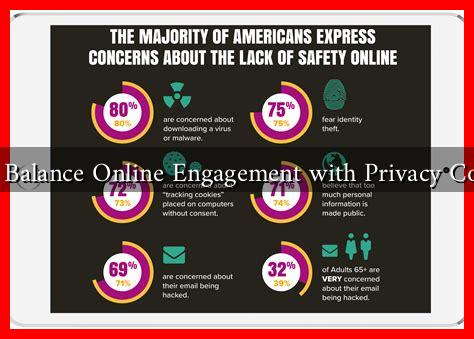-
Table of Contents
- How to Balance Online Engagement with Privacy Concerns
- The Importance of Online Engagement
- Understanding Privacy Concerns
- Strategies for Balancing Engagement and Privacy
- 1. Educate Yourself and Your Audience
- 2. Use Privacy Settings Wisely
- 3. Implement Data Protection Measures
- 4. Foster a Culture of Privacy
- Conclusion
How to Balance Online Engagement with Privacy Concerns
In an increasingly digital world, the balance between online engagement and privacy concerns has become a pressing issue for individuals and organizations alike. With the rise of social media, e-commerce, and digital communication, the need for engagement is often at odds with the desire for privacy. This article explores how to navigate this complex landscape, providing insights and strategies for maintaining a healthy balance.
The Importance of Online Engagement
Online engagement is crucial for various reasons, including:
- Building Relationships: Engaging with audiences fosters connections, whether for personal or professional purposes.
- Brand Awareness: For businesses, active online engagement can enhance visibility and attract potential customers.
- Feedback and Improvement: Engagement allows for real-time feedback, helping organizations to adapt and improve their offerings.
According to a report by Statista, as of 2023, there are over 4.9 billion social media users worldwide, highlighting the vast potential for engagement.
Understanding Privacy Concerns
While online engagement is beneficial, it often comes with significant privacy concerns, including:
- Data Breaches: High-profile data breaches have exposed personal information, leading to identity theft and fraud.
- Surveillance: Governments and corporations may monitor online activities, raising concerns about personal freedoms.
- Informed Consent: Many users are unaware of how their data is collected and used, leading to a lack of trust.
For instance, the Cambridge Analytica scandal in 2018 revealed how personal data from millions of Facebook users was harvested without consent, sparking global outrage and calls for stricter data privacy regulations.
Strategies for Balancing Engagement and Privacy
To effectively balance online engagement with privacy concerns, consider the following strategies:
1. Educate Yourself and Your Audience
Understanding privacy policies and data protection laws is essential. Organizations should educate their audiences about how their data is used and the measures taken to protect it. This transparency builds trust and encourages engagement.
2. Use Privacy Settings Wisely
Most social media platforms offer privacy settings that allow users to control who can see their information. Encourage users to:
- Adjust their privacy settings to limit data sharing.
- Review app permissions regularly.
- Be cautious about sharing personal information publicly.
3. Implement Data Protection Measures
Organizations should prioritize data protection by:
- Using encryption to secure sensitive information.
- Regularly updating software to protect against vulnerabilities.
- Conducting audits to ensure compliance with data protection regulations.
For example, the General Data Protection Regulation (GDPR) in Europe mandates strict guidelines for data collection and processing, compelling organizations to prioritize user privacy.
4. Foster a Culture of Privacy
Encouraging a culture of privacy within organizations can enhance trust. This can be achieved by:
- Training employees on data privacy best practices.
- Creating clear policies regarding data handling and user engagement.
- Encouraging open discussions about privacy concerns among team members.
Conclusion
Balancing online engagement with privacy concerns is a complex but essential endeavor in today’s digital landscape. By educating oneself and others, utilizing privacy settings, implementing robust data protection measures, and fostering a culture of privacy, individuals and organizations can engage effectively while respecting personal privacy. As we navigate this evolving digital world, prioritizing privacy will not only enhance trust but also promote a more secure online environment for everyone.
Ultimately, the key takeaway is that engagement does not have to come at the expense of privacy. With the right strategies in place, it is possible to enjoy the benefits of online interaction while safeguarding personal information.


